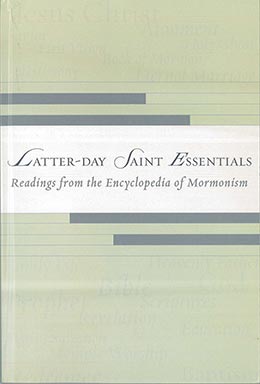LDS Belief in the Bible
Paul Hedengren
Paul Hedengren, “LDS Belief in the Bible,” in Latter-day Saint Essentials: Readings from the Encyclopedia of Mormonism, ed. John W. Welch and Devan Jensen (Provo, UT: BYU Studies and the Religious Studies Center, Brigham Young University, 2002), 52–3.
The Church believes the word of God contained in the Bible. It accepts the Bible “as the foremost of [the Church’s] standard works, first among the books which have been proclaimed as . . . written guides in faith and doctrine. In the respect and sanctity with which the Latter-day Saints regard the Bible they are of like profession with Christian denominations in general” (Talmage, p. 236).
Latter-day Saints value the Bible for many reasons. The Bible presents the revelations of God in several dispensations or eras, each headed by prophets. They also read and follow the Bible for the instructional and spiritual value of the events it describes. While some of the Old Testament describes the law of Moses that Latter-day Saints believe was fulfilled with the Atonement of Christ (3 Ne. 9:17), nevertheless the Old Testament stories, commandments, ordinances, proverbs, and prophetic writings still express the basic patterns of God’s will toward his children and how they should act toward him.
Latter-day Saints revere the New Testament for its account of the birth, ministry, Atonement, and resurrection of the Savior, Jesus Christ. The teachings of Jesus in the New Testament comprise the core of LDS doctrine, and their preeminence is evidenced by their frequent appearance in other LDS standard works accepted as scripture and in LDS speaking and writing.
The writings of the New Testament apostles are accepted and appreciated for their doctrine and wise and inspired counsel and for documenting the apostolic challenge of proclaiming the gospel, adhering to the original teachings of Christ, establishing the unity of the faith, and promoting the righteousness of believers in a rapidly growing Church. Latter-day Saints also find references in several letters of the early apostles of the falling away that necessitated the restoration, alerting the faithful to remain fervent and active in the faith and to stay true to the love of Jesus Christ.
While Latter-day Saints devoutly regard the Bible, they do not consider it the sole authoritative source of religious instruction and personal guidance. They also study accounts of God’s dealings with other ancient peoples such as those found in the Book of Mormon along with the teachings of the Prophet Joseph Smith and the latter-day prophets and apostles. Latter-day Saints consider personal revelation the individual’s ultimate source for understanding scripture and knowing God’s will.
Viewed as being harmonious with each other, all these sources enhance and clarify one another, and aid modern readers in correctly comprehending and translating these texts.
Latter-day Saints believe all that God has revealed. They seek to know and do the word of God wherever it has been made known in truth and authority. They believe that salvation is in Jesus Christ and not in any combination of words or books. They believe in God and in his son Jesus Christ, whose words and ways can be known through a lifetime of scripture study, service, and prayer, and by personal revelation through the power of the Holy Ghost.
Bibliography
Matthews, Robert J. A Bible! A Bible! Salt Lake City, 1990.
Talmage, James E. Articles of Faith. Salt Lake City, 1988.
